|
|
|
|
|
|
|
|
|
Today, no Arctic-science events are scheduled other than Al Roker broadcasting live, in Utqiagvik, Alaska on NBC's Today show.
|
Media
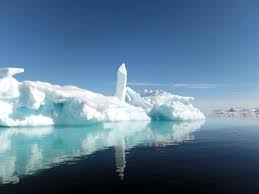 Most of the Arctic's 'Baby Sea Ice' Melts Before it Leaves the Nursery and that's a Problem. Most of the Arctic's 'Baby Sea Ice' Melts Before it Leaves the Nursery and that's a Problem. Sea ice born in the shallow seas off Russia rarely makes it out of its nursery before succumbing to melt. New research finds that two decades ago, half of the sea ice formed near the Arctic coast of Russia went on a windblown journey through the Arctic Ocean and out via the Fram Strait between Greenland and Svalbard before melting. Today, only about 20 percent of the ice born near Russia makes that journey. Live Science
Russia's Bid to Exploit Gas Under the Stunning Arctic Tundra. It isn't every day you find yourself playing ping pong in the Arctic. But there wasn't much else for Charles Xelot and others aboard the Russian cargo ship RZK Constanta to do besides engage in bouts of table tennis, watch TV, or relax in the onboard sauna. The vessel carried construction supplies for a new liquefied natural gas plant on the remote Yamal Peninsula, but its route through the Kara Sea along the Northeast Passage was frozen. An icebreaker couldn't tow it for another couple weeks-leaving the crew plenty of time for R&R. "It was like a paid holiday for them," Xelot says. WIRED
Siberia's Pleistocene Park: Bringing Back Pieces of the Ice Age to Combat Climate Change. Temperatures in the Arctic continue to warm twice as fast as the rest of the world; that's according to the U.S. government's latest climate report. The past five years in the Arctic have been the warmest there since records began in 1900. Decades ago, an eccentric Russian geophysicist warned that frozen soil, called permafrost, contained enough greenhouse gas itself to pose a threat to the climate if it ever melted. Science scoffed at Sergey Zimov's warning but now that the permafrost is collapsing the world is listening. Recently we traveled to the Siberian Arctic to meet Zimov who has devised a scheme to save the world in a place that he named for the last Ice Age: Pleistocene Park. CBS News
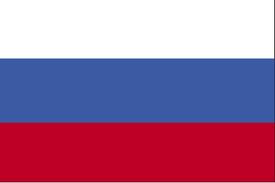 Russian Prosecutor General's Office Takes up Arctic Nature and Mineral Resource Protection. Russian Prosecutor General's Office Takes up Arctic Nature and Mineral Resource Protection. A new department was recently created at the Russian Prosecutor General's Office - the Department for Supervision over Compliance with Environmental Protection and Natural Resource Management Legislation. Its mission includes protecting the Arctic environment and its mineral resources, a representative of the oversight agency told RIA Novosti this Monday. The Arctic
NBC Today Show to Feature ODU Researchers on Location in Arctic Circle April 1 and 2. NBC's TODAY Show, the country's top-rated morning news program, will feature two Old Dominion University (ODU) researchers who are studying climate change in the Arctic during live segments April 1 and 2. TODAY Show host Al Roker will join Victoria Hill, an assistant professor in the Department of Ocean, Earth and Atmospheric Sciences in the College of Sciences, and Petros Katsioloudis, professor and chair of the Department of STEM and Professional Studies in the Darden College of Education and Professional Studies, as they launch Warming and irRadiance Measurement (WARM) buoys in the Arctic Ocean north of Utqiagvik, Alaska. Globe New Wire
|
|
Future Events
 of the AAG includes over 8,500 geographers converging from the U.S., Canada, and nearly 60 other countries in a typical year including geographers, GIS specialists, environmental scientists, and other leaders for the latest in research and applications in geography, sustainability, and GIScience. of the AAG includes over 8,500 geographers converging from the U.S., Canada, and nearly 60 other countries in a typical year including geographers, GIS specialists, environmental scientists, and other leaders for the latest in research and applications in geography, sustainability, and GIScience.
** New this week ** American and Russian Public Opinion, April 8, 2019 (Washington, DC USA). The Center for Strategic & International Studies (CSIS) will host a presentation of the findings from a new binational study of American and Russian public opinion conducted by the Chicago Council on Global Affairs and the Levada Analytical Center. Researchers from the Council and Levada will discuss and provide context for public perceptions of Russia's return to prominence on the world stage, interference in the 2016 U.S. Presidential election, the crisis in Ukraine, and the possibility of a new arms race.
Arctic "Incidents of National Significance" (IoNS) workshop, 18-19 Apr 2019, (Nome, Alaska USA). In coordination with Alaska Natives and other rural Arctic residents, Arctic IoNs planners, organized by the Arctic Domain Awareness Center (ADAC), will conduct a workshop at the UAF NW Campus to discuss the scenario of a large/violent Bering Sea storm that disables a large container ship which loses many containers, some with hazardous materials, followed by damage to coastal structures along the coast. The outcomes will inform a subsequent workshop at UAA in late May and a final report. Workshop discussions will involve experts from many sectors, and will reveal the research necessary to address capability shortfalls that are anticipated to be addressed by funded science and technology awards administered by ADAC. More information, including that on registration, is available here.
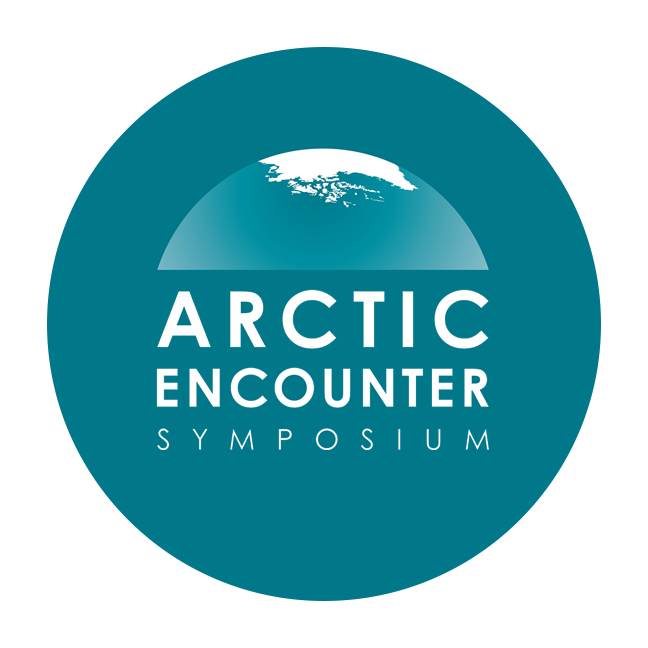 The 6th Annual Arctic Encounter Seattle, April 25-26, 2019 (Seattle, WA, USA). The sixth annual Arctic Encounter Seattle will engage the topic of innovation in the Arctic, specifically disruptive business and investment models, energy and power, climate research, national security, new economic and trade models, and popular media and awareness movements impacting the Far North. The two-day Arctic Encounter Seattle will include an opening reception, two continental breakfasts, two keynote luncheons, a networking reception with Alaskan glacier ice cocktails, and a seated three course dinner including keynotes and live musical entertainment from the Far North. The Arctic Encounter is the largest annual Arctic policy and business conference convening in the United States, with partnerships and convening efforts worldwide. Registration is now open. Additional information is available here. The 6th Annual Arctic Encounter Seattle, April 25-26, 2019 (Seattle, WA, USA). The sixth annual Arctic Encounter Seattle will engage the topic of innovation in the Arctic, specifically disruptive business and investment models, energy and power, climate research, national security, new economic and trade models, and popular media and awareness movements impacting the Far North. The two-day Arctic Encounter Seattle will include an opening reception, two continental breakfasts, two keynote luncheons, a networking reception with Alaskan glacier ice cocktails, and a seated three course dinner including keynotes and live musical entertainment from the Far North. The Arctic Encounter is the largest annual Arctic policy and business conference convening in the United States, with partnerships and convening efforts worldwide. Registration is now open. Additional information is available here.
North X North Festival, May 1-5, 2019 (Anchorage, Alaska USA).The third annual North x North Summit & Festival celebrates connection and culture across the North. The event features five days of conversations, workshops, exhibitions, performances, presentations, music, dance, installations, food, film and experiences highlighting Northern people, landscapes and cultures.The Summit (May 1-2), which is open to registered participants, focuses on resilience and research, with a special emphasis on gender and Indigenizing. The Festival (May 3-5) is open to the general public and features activities and conversations around climate, gender, innovation, food, indigenizing and earthquakes.
2019 Bering Strait Regional Energy Summit, May 7-9, 2019 (Nome, Alaska USA). This event is hosted by the Kawerak Energy Program. Regional residents, stakeholders and partner organizations are invited to come together to learn about energy resources. Attendees will share experiences with energy in their communities, gain knowledge about new energy technologies and funding sources, and help to develop creative ideas for decreasing the cost of energy in the Bering Strait Region by developing efficient, affordable, and sustainable energy projects. For more information or to receive a registration form by fax, please send an email to energy@kawerak.org or call (907) 443-4253. To receive travel funding, all registration forms must be received by April 19, 2019.
Lowell Wakefield Fisheries Symposium, May 7-10, 2019 (Anchorage, Alaska USA). This symposium aims to provide a forum for discussion on ways to facilitate effective cooperative research, a platform for scientific talks on the application and results of cooperative research, and opportunity to evaluate how such research might be best envisioned, applied and implemented. The symposium aims to involve participants from a variety of relevant marine industries, address these issues through facilitated discussion, identify best practices, and articulate a set of case studies for effective collaboration. The symposium also aims to involve scientists from a wide range of sectors, including state and federal agencies, universities, research institutes and industry science. This event is sponsored by Alaska Sea Grant College Program.
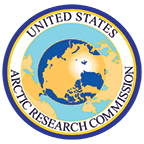 US Arctic Research Commission meeting, May 10, 2019 (Anchorage, Alaska USA) US Arctic Research Commission meeting, May 10, 2019 (Anchorage, Alaska USA)
 |
|  | Commissioners Mayer, Ulmer, and Greene
|
. The 111th meeting of the USARC will be held in the Captain Cook's Endeavor Room from 8:30 am to 4:00 pm. The commission will debut its new, biennial "Report on the Goals and Objectives for Arctic Research 2019-2020 for the US Arctic Research Program Plan" and will hear presentations on Arctic research from invited speakers. A detailed agenda will be provided later at this link.
Arctic and Boreal Carbon: Key Findings from the State of the Carbon Cycle Report, May 14, 2019 (Silver Spring, Maryland USA or via webinar). This is seminar 10 in the Series: From Science to Solutions: The State of the Carbon Cycle, the 2nd State of the Carbon Cycle Report (SOCCR2). The speaker is Dr. Ted Schuur from the Center for Ecosystem Science and Society at Northern Arizona University. Dr. Schuur will present on changing factors that control terrestrial carbon storage in unmanaged arctic and boreal ecosystems. Surface air temperature change is amplified in high-latitude regions, as seen in the Arctic where temperature rise is about 2.5 times faster than that for the whole Earth. Permafrost temperatures have been increasing over the last 40 years.
Synoptic Arctic Survey - International Planning and Coordination Workshop, May 15-16, 2019 (Woods Hole, Massachusetts, USA). An open coordination and planning workshop will be held to continue planning the Synoptic Arctic Survey (SAS). The SAS is a developing international program envisioned to mount a coordinated, multi-nation, oceanographic field based effort on a Pan Arctic scale over two summer seasons (2020-2021). The key objective is to achieve a quasi-synoptic baseline understanding of the fundamental structure and function of the linked Arctic carbon-ecosystem-physical systems that will permit detection of ongoing and future changes. More information and the international science plan is available here. More info on participating in this workshop is available here.
Arctic Science Summit Week, May 22-30, 2019 (Arkhangelsk, Russia). The Arctic Science Summit Week 2019 will take place in Northern (Arctic) Federal University and Northern State Medical University, Russia, Arkhangelsk. Under the auspices of International Arctic Science Committee, participants from more than 23 countries and regions will be involved.
Resilience in Rapidly Changing Arctic Systems, proposals close June 14, 2019. This joint Belmont Forum CRA calls for co-developed and co-implemented proposals from integrated teams of natural and social scientists, and stakeholders to address key areas of arctic resilience understanding and action. This collaboration of academic and non-academic knowledge systems constitutes a transdisciplinary approach that will advance not only understanding of the fundamentals of arctic resilience but also spur action, inform decision-making, and translate into solutions for resilience. The term "stakeholder" is used here in its broadest possible sense, allowing for co-development of projects with partners from, but not limited to, civil society, government, industry, NGOs, and Indigenous organizations.
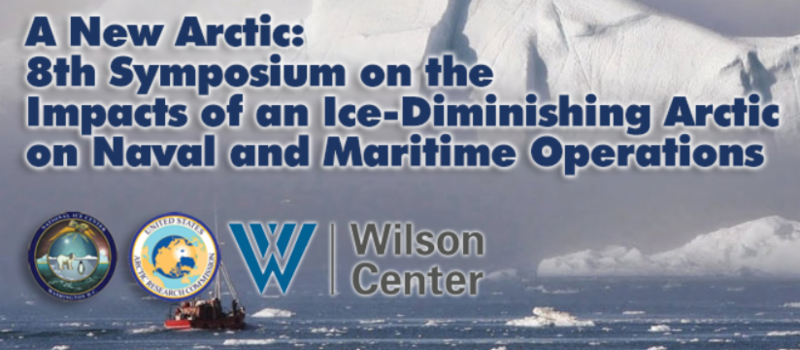
Mark your calendars to attend IDA-8, which some have called one of the best Arctic gatherings around. Historically, this biennial symposium was co-hosted by U.S. National/Naval Ice Center (NIC) and the US Arctic Research Commission (USARC). In 2019, these partners will join forces with the Wilson Center's Polar Institute, and the Patuxent Defense Forum (run by the Patuxent Partnership) as co-hosts. The now 2-day symposium will be held in the Ronald Reagan Building Amphitheater, in Washington, DC. The event will focus on a broad cross-section of naval and maritime operations and issues in an ice-diminishing Arctic. The symposium brings together nationally and internationally recognized experts on Arctic governance, geopolitics, marine operations, infrastructure, science, and environmental observations, from the local, regional, and pan-Arctic scale. Information on prior symposia, including lists of speakers, video clips, and copies of presentations, is available here. Attendance is free, and registration will begin in Spring 2019. The event will be webcast live, and video recorded.
2019 Sea Ice Symposium, August 18-23, 2019 (Winnipeg, Manitoba Canada). IGS co-hosts a sea ice symposium every 5 years. The Centre for Earth Observation Science (University of Manitoba) is excited to be hosting the first IGS event to be held in Canada. The symposium will include oral and poster sessions, and will provide a friendly and intellectually stimulating environment to facilitate face-to-face interactions and networking. Additional activities will include an opening reception, a banquet dinner and a mid-symposium afternoon excursion.
EU Arctic Forum, October 3-4, 2019 (Umeå, Sweden). The European Commission, the European External Action Service, and the Government of Sweden will jointly organize a high-level EU Arctic Forum. The EU Arctic Forum will bring together key Arctic players and stakeholders to assess recent developments in the region and to discuss the new challenges ahead.The EU Arctic Forum will include several keynote addresses and two high-level panel sessions on the morning of 3 October. Foreign ministers from EU member states as well as the Arctic Council will be invited to participate.
|
|

  
4350 N. Fairfax Drive, Suite 510
Arlington, VA 22203, USA
External links in this publication, and on the USARC's World Wide Web site ( www.arctic.gov) do not constitute endorsement by the US Arctic Research Commission of external Web sites or the information, products or services contained therein. For other than authorized activities, the USARC does not exercise any editorial control over the information you may find at these locations. These links are provided consistent with the stated purpose of this newsletter and the USARC Web site.
|
|
|
|
|
|
|
|
|